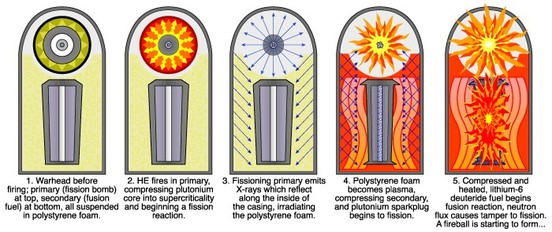

- #Cobalt bomb vs hydrogen bomb how to
- #Cobalt bomb vs hydrogen bomb movie
- #Cobalt bomb vs hydrogen bomb free
I thought I had revealed all the interesting H-bomb secrets some twenty years earlier in The Progressive magazine. 2Īs an interested party, of sorts, I watched the unfolding Lee melodrama with a sense of disappointment.
#Cobalt bomb vs hydrogen bomb movie
Lee filed a civil lawsuit against the government, and a made for TV movie was produced. Supporters complain that Wen Ho Lee had been racially profiled and scapegoated. District Judge James Parker apologized to Lee from the bench for his pre-trial detention and scolded the government for misconduct in the case.
#Cobalt bomb vs hydrogen bomb free
In September of 2000, he was set free for time served, after a token guilty plea to one of the 59 counts and a promise to answer all questions. He was never charged with spying or with transmitting any secrets to anyone, and there is no evidence that he did such things. He was denied bail on a government theory that unless he was held incommunicado, he might contact his spy handler � this despite a 59-count indictment for merely mis-handling highly technical nuclear data of dubious value. On April 29, columnist William Safire told Times readers, "Thanks to the downloading of our secrets, American cities will be less safe in two years than they were at the height of the cold war." Really?īy the fall of 2000, the case had been downgraded to a controversy over the treatment of Wen Ho Lee, who had been arrested in New Mexico on December 10, 1999, and held in pre-trial solitary confinement for nine months. Times reporters Jeff Gerth and James Risen pursued the story like Woodward and Bernstein on the trail of the next Watergate. Twenty years later, in 1999, the H-bomb secret was back in the news when Republican members of Congress began leaking information to the New York Times about Wen Ho Lee, an alleged spy for China at the Los Alamos laboratory in New Mexico.
#Cobalt bomb vs hydrogen bomb how to
To this day, most people who remember the case, but didn't read the article, think I published a set of nuts-and-bolts instructions on how to build a hydrogen bomb in a suburban garage, a quite impossible task which I would neither advocate nor abet, were it possible. The article, essentially an anti-nuclear diatribe, was published unaltered in the November issue, six months late. 1Įarly observers thought it was a case the government couldn't lose, but the plaintiff's argument for censorship fell apart after six months of litigation, and freedom of the press prevailed.

The Carter Administration's effort to impose "prior restraint" on publication produced a landmark First Amendment lawsuit, USA vs.

In February of that year, I challenged nuclear secrecy's justification and utility in an article drafted for The Progressive magazine, titled "The H-Bomb Secret: To Know How is to Ask Why" � and the government challenged our right to publish it. In 1979 this situation was widely accepted as a fundamental necessity of the nuclear age and the Cold War. Even in democratic nations, where the resulting secret technology was controlled by elected officials, the electorate had no idea what doomsday machines were being developed and what fateful decisions were being made. Many disappeared into secret government laboratories to become engineers of mass destruction. However, by the middle third of the Twentieth Century, as relations between nations were descending into hell, science gave technology such destructive powers that scientists began voluntarily withholding their findings from publication. The founders of modern democracy, as creatures of The Enlightenment, understood this, and they didn't allow for easy exceptions to freedom of speech. If the electorate is not engaged in the policy process, invested with knowledge and credible standing, the best it can hope for is to periodically elect a wise dictator. Likewise, democracy requires informed debate on public policy. It is equally valid in all languages and cultures, and all scientists will insist on eventually having access to the work of all others. Scientific knowledge is a global accumulation of published and verified findings. Both institutions require the free flow of information. Since no nation wants to help its enemies get nuclear weapons, nuclear secrecy seems like a reasonable exception to the ideal of openness in modern societies.īut state secrets of any kind pose a dilemma for science and democracy.

Do ordinary people really care how nuclear weapons work? Conventional wisdom holds that only bomb makers need to know such things.


 0 kommentar(er)
0 kommentar(er)
